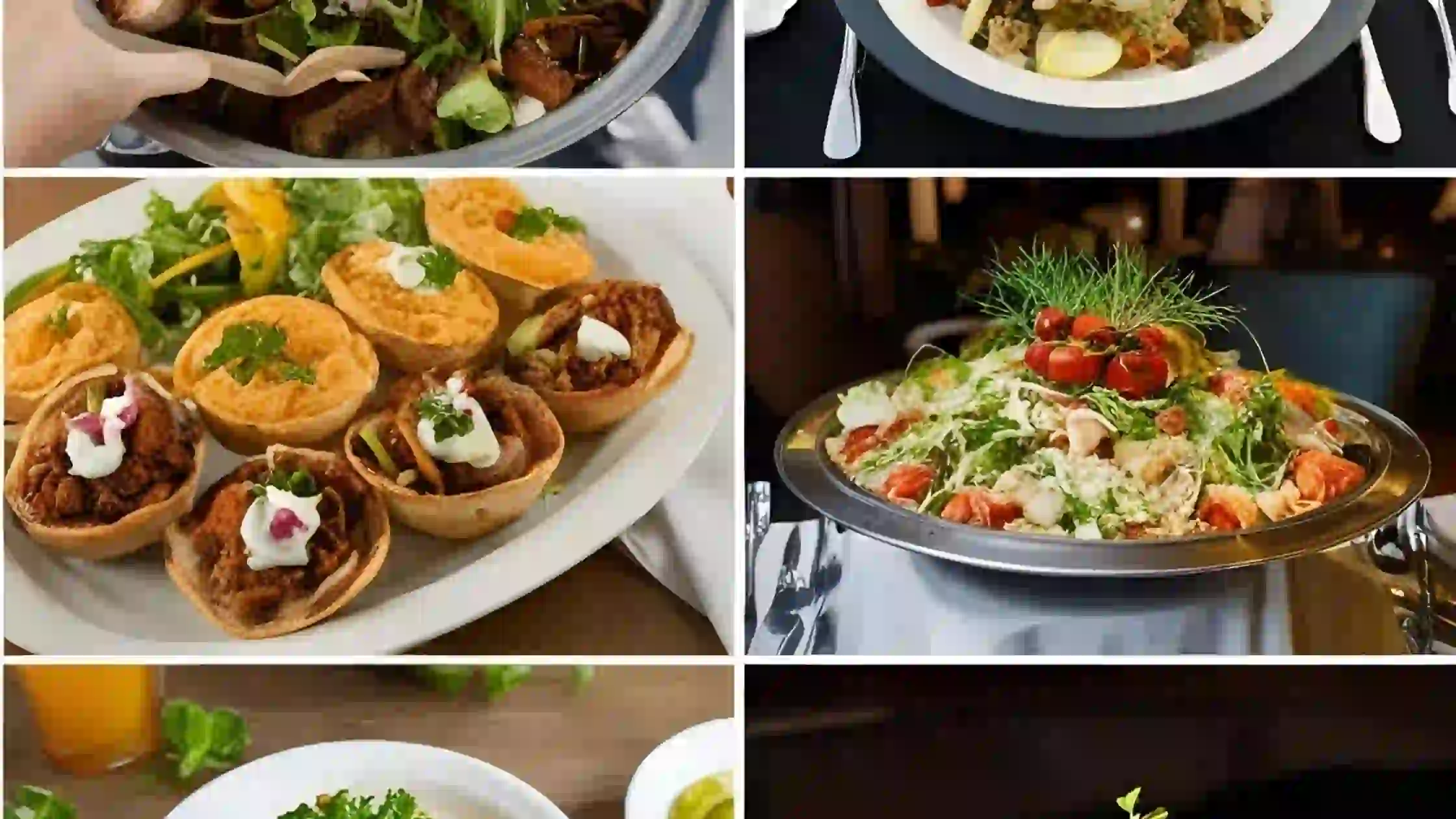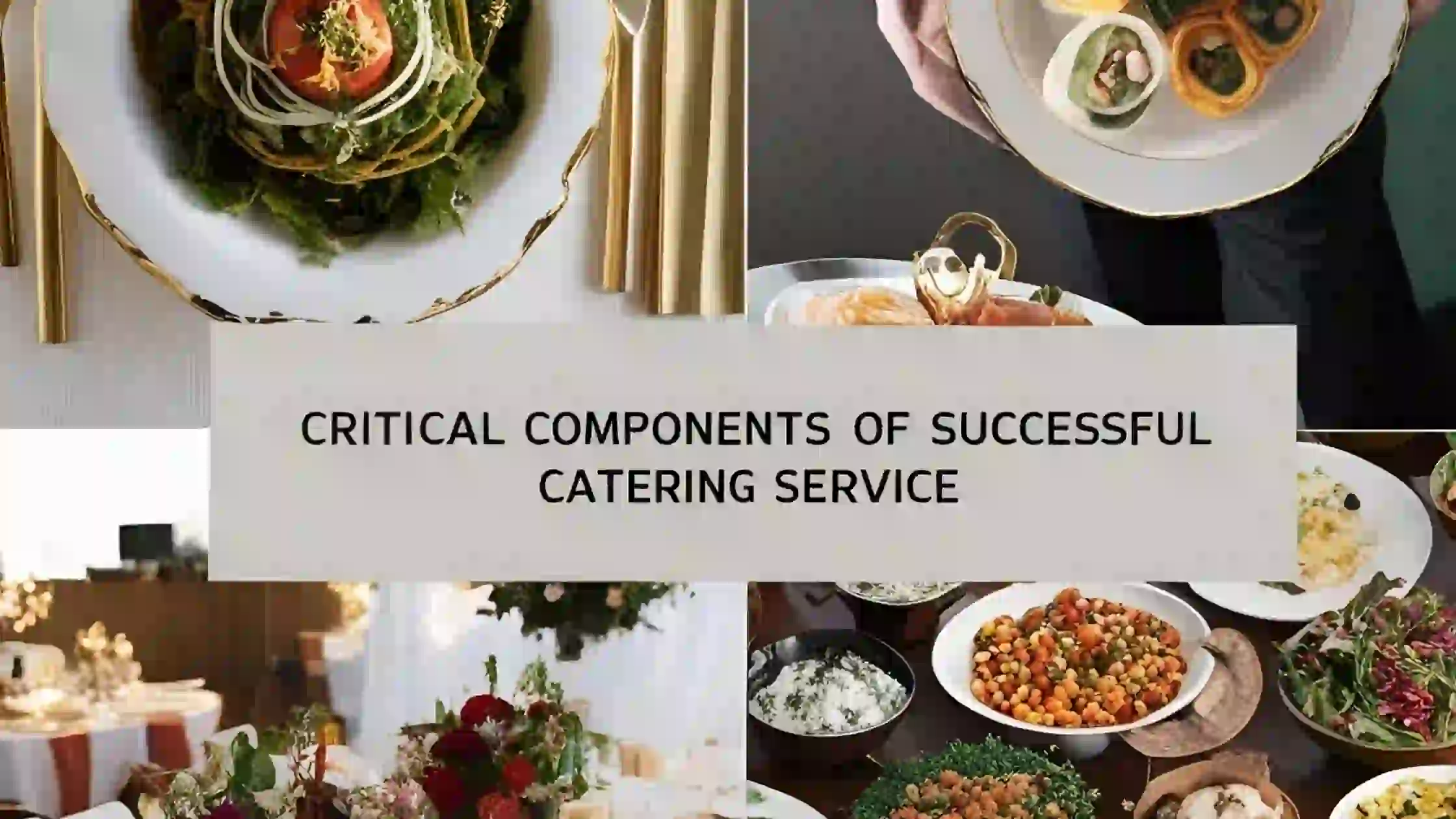Food catering has become an essential element of modern events, offering professional food and beverage services for weddings, birthday parties, corporate meetings, and more. But what exactly is food catering, and why is it now considered a crucial part of any successful event?
In today’s fast-paced world, food catering services have gained immense popularity due to convenience, diverse menu options, and the ability to provide a seamless culinary experience tailored to different occasions. Whether you’re planning an intimate family gathering or a large corporate function, catering ensures that the food aspect of your event is executed flawlessly.
What is Food Catering?
Food catering is a professional service that provides meals and beverages at events. It involves everything from menu planning and food preparation to presentation and cleanup, allowing hosts to focus on their guests without worrying about cooking or serving.

Catering services range from small-scale setups for family dinners or birthday parties to full-scale services for weddings, corporate conferences, and festivals. This flexibility makes catering a valuable addition to any event.
Examples of food catering include:
- Buffet spreads at weddings
- Boxed lunches for corporate meetings
- BBQ stations at family reunions
- Elegant dessert tables at private parties
Caterers bring both expertise and efficiency to ensure guests enjoy a high-quality dining experience, regardless of the event size or type.
Who is a Caterer?
A caterer is a professional or business responsible for preparing, delivering, and serving food at events. Their responsibilities go beyond just cooking; they handle logistics, presentation, customer service, and coordination with event planners to ensure everything runs smoothly.
Key Responsibilities of a Caterer:
- Menu Planning to suit the theme and preferences
- Sourcing and purchasing ingredients
- Cooking and preparing meals
- Setting up food stations or serving areas
- Coordinating with clients and other vendors
- Supervising service staff
- Ensuring food safety and quality standards
A successful caterer is organized, creative, customer-focused, and highly adaptable, especially when managing large or high-profile events.
Why Food Catering is Essential for Events
Hiring a catering company brings several advantages that can elevate the overall experience of any event. Here’s why food catering is essential:
1. Professional Service
Catering companies provide trained chefs and service staff who ensure that food is served professionally and efficiently. Their experience helps maintain smooth operations, even during large-scale events.
2. Time and Stress Management
Planning food for events can be overwhelming. Caterers take over everything from menu design to cleanup, allowing hosts to enjoy the event stress-free.
3. Customization and Personalization
Caterers work closely with clients to create personalized menus and service styles that align with the event theme and guest preferences, including dietary restrictions.
4. High-Quality Food and Variety
Professional catering ensures top-tier food quality, diverse cuisines, and creative presentation that impress guests and enhance the event experience.
Types of Catering Services
There are different types of catering services, each catering to specific event requirements:
1. Corporate Catering
Ideal for meetings, seminars, and conferences, corporate catering includes breakfast, lunch, coffee breaks, and formal dinners. In places like Singapore and Dubai, companies offer specialized corporate catering services with customized menu options and elegant presentations.
2. Wedding Catering
Wedding caterers work closely with couples to design menus that reflect their culture, preferences, and wedding theme. Services often include engagement dinners, ceremony snacks, main receptions, and dessert stations.
3. Social Event Catering
Catering for social gatherings such as birthdays, anniversaries, and holiday parties focuses on fun, creative themes, and informal menus that encourage socializing.
4. Mobile Catering
Food trucks and mobile units serve fresh, on-the-go food at festivals, outdoor events, and private functions. This option is trendy, flexible, and perfect for casual gatherings.
5. Industrial Catering
This service caters to large-scale institutions like hospitals, schools, factories, and military bases, focusing on volume, nutrition, and efficiency.
6. Specialty Catering
For themed or exclusive events, specialty caterers offer custom menus—such as vegan, keto, or gluten-free options—and gourmet experiences that are tailored to unique dietary needs or concepts.
The Growing Popularity of Catering Services
The catering industry has witnessed exponential growth globally. In Middle East alone, the food services sector was valued at over $20.7 billion in 2023, highlighting the increasing demand for high-quality food at events. The trend reflects not only busy urban lifestyles but also the cultural importance of food in celebrations.
On-Premise vs. Off-Premise Catering
When planning an event, understanding the difference between on-premise and off-premise catering is essential to choosing the right service for your needs. Each style offers distinct advantages based on the type of event, location, and guest expectations.
1. On-Premise Catering
On-premise catering involves preparing and serving food directly at the event venue. This often means the caterer has access to a kitchen on-site or sets up a temporary cooking station to serve guests fresh, hot meals.
Benefits of On-Premise Catering:
- Freshly Prepared Dishes: Food is cooked and served immediately, enhancing flavor and presentation.
- Interactive Experience: Guests can watch chefs at work, adding an entertaining element to the dining experience.
- Customizable Menus: Chefs can adapt menus on the spot to suit the event’s theme and guest preferences.
This setup is ideal for venues such as banquet halls, hotels, or any location with kitchen facilities. It’s commonly used for weddings, live cooking stations at corporate events, or private celebrations where freshness and interaction are key.
2. Off-Premise Catering
Off-premise catering means the food is prepared in a central kitchen and transported to the event venue. This model offers greater flexibility in terms of location and logistics.
Benefits of Off-Premise Catering:
- Versatility in Location: Host events anywhere—from gardens to rooftops—without requiring kitchen facilities.
- Efficient Execution: Food arrives ready to serve, allowing hosts and guests to focus on the event itself.
- Minimal On-Site Setup: Reduces the need for extensive equipment and staffing at the venue.
This approach is especially useful for outdoor events, corporate functions, and social gatherings in locations without kitchen access. Off-premise catering also allows more time for guests and hosts to enjoy the event, as all cooking is done in advance.
Critical Components of a Successful Catering Service
Delivering a memorable catering experience requires more than just good food. From meticulous planning to seamless execution, several critical components contribute to a successful catering service. Here’s a breakdown of the essential elements, with real-world examples from top Middle Eastern caterers.

1. Menu Planning
Effective menu planning lays the foundation for a well-executed catering service. It involves designing a menu that aligns with the event’s theme, guest preferences, and dietary requirements.
Key Considerations:
- Dietary Restrictions: Offer vegetarian, vegan, gluten-free, and allergen-friendly options to cater to all guests.
- Event Type: Tailor the menu to fit the occasion—plated dinners for weddings, bento boxes for corporate meetings, or buffet spreads for social events.
- Cultural Relevance: In multicultural settings like the Middle East, incorporate traditional dishes alongside modern offerings.
2. Food Preparation and Presentation
The quality of food preparation and presentation leaves a lasting impression. Caterers must prioritize hygiene and visual appeal to enhance the dining experience.
Key Considerations:
- Food Safety: Adherence to food handling and hygiene standards is non-negotiable.
- Aesthetic Appeal: Creative plating and presentation elevate the perceived value of the meal.
3. Logistics and Transportation
Efficient logistics and transportation ensure food arrives at the venue on time and in excellent condition.
Key Considerations:
- Timely Delivery: Punctuality is essential to maintain food temperature and quality.
- On-Site Setup: Professional setup of food stations or dining areas contributes to smooth event flow.
4. Staffing
Experienced staffing is crucial for executing a polished catering experience. This includes not only chefs but also servers and event coordinators.
Key Roles:
- Chefs: Ensure food quality and consistency.
- Service Staff: Deliver attentive, courteous service to guests.
- Event Coordinators: Manage logistics and troubleshoot issues in real time.
5. Equipment and Supplies
Having the right equipment and supplies ensures that the catering setup is professional, efficient, and visually appealing.
Essentials Include:
- Cooking Equipment: Commercial-grade appliances for bulk preparation.
- Serving Tools: Chafing dishes, ladles, platters, and utensils.
- Dining Ware: Elegant plates, cutlery, and glassware enhance the guest experience.
6. Customer Service
Exceptional customer service is at the heart of every successful catering business. From initial inquiry to post-event feedback, attentiveness and professionalism matter.
Key Touchpoints:
- Initial Consultation: Understanding the client’s vision, goals, and constraints.
- During the Event: Responsive support to guest requests and last-minute changes.
- Post-Event: Follow-up for feedback and relationship-building.
Catering Trends in Middle East
The catering industry in Middle East is evolving rapidly, driven by changing customer preferences, sustainability demands, and technological advancements. Below are the top trends reshaping the region’s catering landscape—with real-life examples that highlight how leading companies are adapting.
1. Local and Sustainable Ingredients
Today’s consumers are increasingly eco-conscious, favoring caterers who use locally sourced and sustainable ingredients. This trend supports local agriculture, reduces carbon footprints, and guarantees fresher produce.
2. Fusion Cuisine
Fusion menus—which creatively blend regional flavors with international influences—are increasingly in demand, especially for modern weddings and upscale corporate events.
This trend allows caterers to appeal to broader audiences while adding an exciting twist to traditional menus.
3. Health-Conscious Menus
More clients are requesting nutritious and wellness-focused meals, including gluten-free, plant-based, and low-calorie options. Health-conscious catering reflects growing awareness of personal well-being and dietary control.
4. Technology Integration
Digital tools are revolutionizing catering services, making planning more convenient and efficient for both clients and caterers. From online ordering systems to virtual tastings, technology enhances customer experience.
This trend makes catering more accessible, especially for busy professionals planning events remotely.
5. Customization and Personalization
Today’s clients expect tailored experiences. Whether it’s a personalized menu, themed table setup, or branded packaging, customization allows clients to put their stamp on the event.
Choosing the Right Catering Service
Selecting the right catering service is essential to the success of any event, whether it’s a corporate function, a wedding, or a private celebration. The ideal caterer not only provides high-quality food but also delivers excellent service, ensures smooth logistics, and creates an unforgettable guest experience.
Here are key factors to consider when evaluating catering services:
1. Define Your Budget
Start by establishing a clear budget for your catering needs. This helps narrow down your options and ensures there are no surprises later. Be sure to understand what’s included in the pricing—such as food, staffing, equipment, delivery, setup, and service charges.
2. Consider the Event Type
Different events require different catering styles. A formal dinner may call for plated service, while casual gatherings might be better suited to buffets or food stations. Choose a caterer experienced in your type of event to ensure a seamless experience.
3. Assess Menu Variety and Customization
A strong catering service offers diverse menu options that align with your event theme and guest preferences. Look for caterers who can tailor dishes to match your vision and provide customizable menu packages for flexibility.
4. Accommodate Dietary Restrictions
It’s crucial to cater to dietary requirements, including vegetarian, vegan, gluten-free, or allergen-sensitive options. A reliable caterer should offer inclusive menu choices to ensure all guests can enjoy the meal comfortably.
5. Ask About Tasting Sessions
Tasting sessions allow you to sample menu items before committing. This helps you assess food quality, presentation, and portion sizes—ensuring confidence in your final selections.
6. Evaluate Experience and Reputation
Look for caterers with a proven track record. Review client testimonials, browse online ratings, or ask for references. Experience matters, especially for large-scale events where timing, consistency, and professionalism are critical.
7. Confirm Logistics and Equipment
Discuss all logistical details, including food delivery times, venue setup, and necessary equipment such as tables, serving ware, and heating elements. Ensure the caterer can handle the size, location, and complexity of your event.
8. Prioritize Customer Service
From your first interaction, assess how responsive, transparent, and helpful the catering team is. A caterer who communicates clearly and understands your needs will make the planning process smoother and the event more successful.
Catering Service Selection Checklist
Use this checklist when choosing a caterer:
- Budget aligns with your expectations
- Experience with your event type
- Menu offers variety and customization
- Dietary restrictions can be accommodated
- Tasting session is available
- Positive reviews and proven reliability
- Delivery and setup logistics are well-planned
- Excellent customer service and communication
Best Catering Company in Dubai – Catering Service CompanyDubai
If you’re planning an event in Dubai, Catering Service Company Dubai stands out as the best catering service provider in the region. Known for its exceptional service, diverse menu offerings, and customized event solutions, they cater to all kinds of functions—from luxury weddings and corporate galas to intimate private gatherings.
Why Choose Catering Service Dubai?
- Expertise in managing events of all sizes
- Wide range of cuisines including Arabic, Continental, and Asian
- Creative and elegant food presentations
- Professional and courteous staff
- Flexible menu customization for all dietary needs
Whether it’s a formal corporate luncheon or a vibrant birthday celebration, Catering Service Dubai guarantees a memorable dining experience that delights your guests and relieves your event planning stress.
In Conclusion, food catering is more than just providing meals—it’s about creating experiences, enhancing celebrations, and ensuring smooth event execution. Whether it’s a grand wedding or a corporate meeting, hiring a professional catering company like Catering Service Dubai is the key to a successful, stress-free, and flavorful event.
